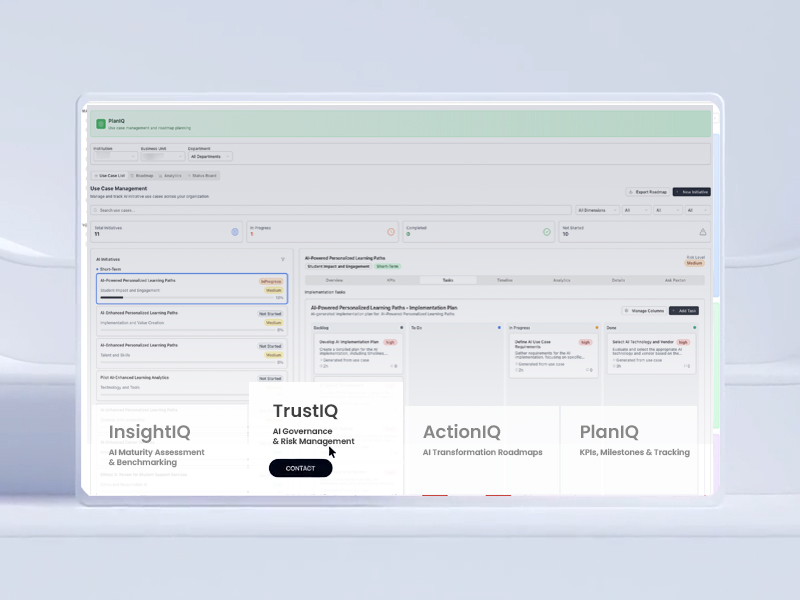Introduction
In today’s rapidly evolving digital landscape, the adoption of artificial intelligence (AI) across various sectors has become a centerpiece of innovation and competitiveness. However, the journey towards AI transformation is fraught with complexities that cannot be addressed through a one-size-fits-all strategy. The unique challenges and goals of each organization demand a tailored approach, underscoring the critical importance of customization in AI strategies.
The Importance of Customization
A tailor-made AI strategy is not merely beneficial; it is essential for success. Generic AI solutions, while seemingly convenient, often fail to address the nuanced needs of different organizations, leading to suboptimal outcomes and inefficient resource use. Customized AI strategies, on the other hand, are designed to align precisely with an organization’s specific operational, cultural, and competitive landscapes. By doing so, these strategies ensure that AI initiatives deliver maximum impact, enhancing targeted areas of the business while driving overarching business goals.
Setting the Stage for Tailor-Made AI Strategies
The process of customizing an AI strategy involves a deep dive into the organization’s core operations, aspirations, and challenges. This approach not only ensures that the AI solutions implemented are perfectly suited to the organization’s needs but also that they are scalable, adaptable, and capable of evolving along with the business landscape. Tailor-making AI strategies is a crucial step for businesses that want to fully leverage AI to not just keep up with their competitors, but to outpace them, transforming challenges into opportunities for growth and innovation.
As we delve deeper into the world of customized AI solutions, it becomes clear that the path to successful AI implementation is paved with strategic choices tailored to individual business contexts. This approach empowers businesses to not only implement AI but to optimize its benefits, transforming technology into a powerful ally in their quest for innovation and market leadership. In the following sections, we will explore the framework for developing such a strategy and the essential components that must be considered to create a cohesive and effective AI roadmap.
Understanding Your Organization’s Needs
To effectively harness the power of artificial intelligence, it’s essential to start with a clear understanding of your organization’s current capabilities and strategic objectives. This foundational knowledge ensures that AI integration is not only feasible but also aligned with driving meaningful business outcomes.
Assessing Current Capabilities
The first step in tailoring an AI strategy is to evaluate your organization’s existing technological and data capabilities. This assessment should address several key areas:
- Technology Infrastructure: Examine the current IT infrastructure to determine if it can support the demands of advanced AI solutions. This includes hardware, software, network capacity, and cloud integration.
- Data Readiness: Assess the quality, quantity, and accessibility of the data available. AI systems require high-quality data to perform effectively. Identify any gaps in data collection, storage, and management that need to be addressed to leverage AI capabilities fully.
- Skill Sets and Resources: Review the current skill levels within your organization related to AI and data science. Understanding where your team stands in terms of AI readiness can help you plan for necessary training or new hires.
Identifying Strategic Objectives
Aligning AI objectives with your business goals is crucial for ensuring that your AI initiatives drive the most value. This process involves:
- Goal Alignment: Map out how AI can address specific business challenges or opportunities. For example, if improving customer satisfaction is a key goal, consider AI applications in customer service such as chatbots or personalized recommendations.
- Priority Setting: Determine which business areas will benefit most from AI enhancements. Prioritize AI projects based on their potential impact on your business goals and their feasibility given your current capabilities.
- Stakeholder Engagement: Involve key stakeholders from various departments to get a holistic view of where AI can create value. This collaborative approach not only ensures alignment with broader business objectives but also facilitates smoother adoption as projects roll out.
By thoroughly assessing your current capabilities and clearly identifying your strategic objectives, you can ensure that your AI strategy is built on a solid foundation. This preparation not only paves the way for successful AI integration but also maximizes the return on your AI investments, driving innovation and efficiency where it matters most.
Framework for Developing a Custom AI Strategy
Developing a customized AI strategy requires a comprehensive framework that addresses several critical areas: data management, technology selection, talent acquisition, and ethical considerations. Each of these components plays a vital role in ensuring that your AI initiatives are both effective and sustainable.
Data Strategy
The foundation of any successful AI strategy is a robust data governance model. Data governance involves the management of data availability, usability, integrity, and security in an enterprise.
- Quality and Integration: Ensure that data is not only high-quality and clean but also integrated effectively across various sources. This is crucial for AI systems, which rely on vast amounts of diverse data to generate accurate insights.
- Accessibility and Security: Data must be accessible to those who need it while being protected from unauthorized access. Implementing strong data protection measures and privacy policies is essential to maintain the trust of your customers and comply with regulatory requirements.
- Scalable Infrastructure: As your organization grows, your data infrastructure should scale accordingly. Planning for scalability from the outset prevents future bottlenecks and supports the increasing demands of advanced AI applications.
Technology Selection
Choosing the right AI technologies is critical to the success of your strategy. This selection should align with your current IT infrastructure and your long-term business goals.
- Compatibility and Integration: Select technologies that integrate well with your existing systems to avoid costly overhauls. This includes considering cloud solutions, on-premise options, or hybrid models depending on your organizational needs.
- Scalability and Flexibility: Opt for solutions that not only meet current needs but can also scale as your AI initiatives expand. Flexibility in technology choices allows for adjustments as your strategy evolves and new opportunities arise.
- Vendor Selection: Evaluate potential technology partners based on their ability to meet your specific requirements, their expertise in your industry, and their track record for support and innovation.
Talent Acquisition and Development
A successful AI strategy also depends on having the right talent in place.
- Skill Gaps and Recruitment: Identify skill gaps within your current team and recruit AI professionals who can bring the necessary expertise to your projects. This might include data scientists, AI specialists, and project managers experienced in AI deployments.
- Training and Development: Invest in training programs to develop AI capabilities within your existing workforce. This not only enhances your team’s skills but also fosters a culture of innovation and continuous learning.
- Team Structure: Consider how to structure your teams to best support AI initiatives. This may involve creating dedicated AI units or integrating AI expertise across different functional areas.
Ethical Considerations
Incorporating ethical AI practices from the start is not just a regulatory requirement but a business imperative that builds trust and compliance.
- Transparency and Accountability: Ensure that your AI systems operate in a transparent manner, with clear accountability for decisions made by AI. This builds trust among users and stakeholders.
- Bias and Fairness: Actively work to identify and mitigate biases in AI algorithms. Regular audits and updates to AI models can help address fairness issues and improve outcomes.
- Privacy and Security: Adhere to the highest standards of data privacy and security, especially when handling sensitive customer information. This includes complying with global regulations like GDPR and CCPA.
By systematically addressing these key areas in your AI strategy, your organization can not only navigate the complexities of AI implementation but also leverage these technologies to drive significant business value. Acacia Advisors is equipped to guide you through each step of this framework, ensuring that your AI strategy is not only tailored to your needs but also positioned for long-term success.
Integration and Implementation
Successfully integrating and implementing AI into an organization requires careful planning and strategic execution. The goal is to ensure that AI solutions enhance existing business processes without causing unnecessary disruption, thereby maximizing adoption and delivering tangible results. Here, we’ll explore effective tactics for seamless integration and the strategic use of pilot programs to facilitate scaling.
Seamless Integration Tactics
Integrating AI solutions into existing business processes can be a complex task that demands meticulous attention to detail and strategic foresight. The following tactics can help ensure that AI integration is as smooth and effective as possible:
- Cross-Functional Collaboration: Engage stakeholders from various departments early in the process to ensure that the AI solutions align with the specific needs and workflows of each area. This collaborative approach not only aids in identifying the best opportunities for AI integration but also prepares each team for upcoming changes, thereby smoothing the transition.
- Customized Integration Plans: Develop tailored integration plans that consider the unique aspects of your business operations. This might involve phased rollouts or starting with departments that have the most to gain from immediate AI enhancements.
- Technology Compatibility Checks: Before implementation, ensure that the chosen AI technologies are compatible with your existing IT infrastructure. This involves technical assessments and possibly updates to hardware and software to support new AI functionalities.
- Training and Support: Provide comprehensive training and support to all users affected by the new AI implementations. Continuous education about AI capabilities and benefits can foster a positive adoption atmosphere and reduce resistance among staff.
Pilot Programs and Scaling
Pilot programs play a critical role in the AI integration process, offering a controlled environment to test strategies and refine them before wider implementation:
- Testing and Learning: Pilot programs allow you to test how AI solutions work in practice, providing invaluable data on their effectiveness and the need for adjustments. This iterative process helps to fine-tune the AI applications based on actual performance and user feedback before full-scale rollout.
- Risk Mitigation: By starting with a pilot program, you can mitigate the risks associated with full-scale implementation. This approach allows you to identify potential problems and address them in a more manageable setting, which can prevent costly errors and disruptions later on.
- Proof of Concept: Pilots serve as proof of concept, demonstrating the value of AI investments to stakeholders and gaining their buy-in. Successful pilot projects can help secure additional funding and support for broader AI initiatives.
- Scalability Insights: Pilot projects also provide insights into the scalability of AI solutions. They help you understand the challenges and requirements of expanding AI integration across your organization, informing better scaling strategies.
By strategically managing AI integration and starting with well-planned pilot programs, organizations can enhance their readiness for broader AI adoption. This phased approach not only ensures that AI solutions are optimized for effectiveness but also builds confidence among stakeholders, paving the way for successful full-scale implementation. As part of this process, Acacia Advisors offers expert guidance and support, ensuring that your AI initiatives are seamlessly integrated and scaled to drive the most value for your organization.
Measuring Success and Making Adjustments
A critical aspect of any AI strategy is the ability to measure its success and make informed adjustments based on empirical data. Establishing clear key performance indicators (KPIs) and setting realistic expectations for return on investment (ROI) are essential to track the effectiveness of AI initiatives. Additionally, fostering an environment of continuous learning and adaptation ensures that your AI strategies remain relevant and optimized over time.
Setting KPIs and ROI Expectations
To effectively measure the impact of AI, it is vital to establish specific, measurable, and relevant KPIs that align with your strategic business objectives:
- Identify Impact Areas: Determine which aspects of your business will most likely be impacted by AI initiatives, such as increased sales, reduced operational costs, or improved customer satisfaction.
- Develop Quantitative Metrics: For each impact area, develop quantitative metrics that can be directly linked to AI interventions. For instance, if reducing customer response time is a goal, measure the average response time before and after AI implementation.
- Set Baselines and Targets: Establish baseline measurements before implementing AI solutions and set realistic targets for performance improvements. This provides a clear benchmark against which to measure progress and success.
- ROI Calculation: Define how ROI will be calculated in the context of AI investments. This involves assessing the cost savings or revenue increases attributable to AI, compared to the total cost of AI implementation and operation.
Continuous Learning and Adaptation
The dynamic nature of both AI technology and business environments requires a proactive approach to continuous learning and strategy adaptation:
- Feedback Loops: Implement feedback mechanisms to continuously collect data on AI performance and user feedback. This data is crucial for understanding how AI solutions are performing in real-world scenarios and where adjustments may be needed.
- Iterative Improvements: Use the insights gained from ongoing data analysis to make iterative improvements to AI models and their deployment strategies. This might involve refining algorithms, expanding data sets, or tweaking user interfaces.
- Stay Agile: Maintain organizational agility to respond to new technologies and changes in market conditions. This flexibility can be a significant competitive advantage, allowing your business to adapt AI strategies quickly and efficiently.
- Learning Culture: Cultivate a culture of learning and innovation within the organization. Encourage employees to experiment with new ideas and learn from both successes and failures in AI projects.
By systematically measuring the success of your AI initiatives through well-defined KPIs and ROI metrics, and by fostering a culture of continuous learning and adaptability, your organization can not only achieve but also sustain significant competitive advantages through AI. Acacia Advisors can guide you in setting up effective measurement and adjustment mechanisms, ensuring that your AI strategy continually evolves in alignment with your business goals and the latest market developments.
Conclusion
As we have explored throughout this blog post, the path to harnessing the full potential of artificial intelligence within any organization is nuanced and requires a meticulously tailored approach. A customized AI strategy is not just a nice-to-have but a necessity for businesses seeking to truly leverage AI to its fullest extent.
The Necessity of a Tailored Approach
A one-size-fits-all solution simply cannot address the unique challenges and opportunities specific to each organization. Custom AI strategies allow for the careful alignment of technology with business-specific goals, ensuring that every AI initiative drives meaningful value. This approach enables organizations to not only meet their current operational needs but also adapt dynamically to future changes and advancements in technology.
Customization goes beyond mere technical implementation; it encompasses understanding the organizational culture, refining data governance, selecting appropriate technologies, and ensuring that the workforce is prepared and trained. This holistic approach ensures that AI solutions are integrated smoothly and sustainably, fostering both immediate improvements and long-term innovation.
Acacia Advisors: Your Partner in AI Strategy
With Acacia Advisors as your strategic partner, you gain access to expert guidance and a collaborative approach tailored to your unique business context. Our commitment to developing and implementing bespoke AI strategies ensures that your investment in artificial intelligence is optimized for maximum impact. We stand ready to help you navigate the complexities of AI integration, from initial strategy formulation through to full-scale execution and beyond.
In conclusion, adopting a tailored AI strategy is essential for any organization aiming to capitalize on the transformative potential of AI. By ensuring that AI initiatives are perfectly aligned with specific business needs and goals, organizations can achieve not only technological integration but true business transformation. Acacia Advisors is here to guide you through this journey, ensuring that your AI strategy is a powerful catalyst for growth and innovation.
The Role of Acacia Advisors in Your AI Strategy
As you embark on the journey of developing and implementing a tailor-made AI strategy, Acacia Advisors stands ready to provide expert guidance and a collaborative partnership approach. Our role is to ensure that your AI initiatives are not only successful from the start but also continue to deliver value as your business and the technological landscape evolve.
Expert Guidance
Acacia Advisors offers comprehensive support throughout the entire lifecycle of your AI strategy:
- Initial Assessment and Strategy Formulation: We begin by thoroughly assessing your current capabilities and business objectives. This initial evaluation forms the basis for a strategic plan that outlines how AI can be utilized to meet your specific needs.
- Customized Solution Development: Our team works with you to develop AI solutions that are customized to fit your unique operational requirements. This involves selecting the right technologies, designing data governance frameworks, and planning integration with existing systems.
- Implementation Support: Acacia Advisors provides hands-on support during the implementation phase, ensuring that AI solutions are seamlessly integrated into your business processes without disruption. We help manage the technical and cultural changes associated with AI adoption, facilitating smooth transitions and widespread acceptance among your staff.
- Performance Monitoring and Optimization: After deployment, we continue to support your organization by monitoring the performance of AI implementations. Using the insights gathered, we help you optimize processes and make necessary adjustments to maximize the benefits of AI.
Partnership Approach
Our relationship with clients is built on a partnership model that emphasizes close collaboration and alignment with your business goals:
- Collaborative Planning: At Acacia Advisors, we believe that the best results are achieved through collaboration. We work closely with your teams at every level to ensure that the AI strategy reflects the collective expertise and strategic vision of your organization.
- Adaptability and Scalability: We understand that business needs and market conditions can change rapidly. Our AI strategies are designed not just for current requirements but with the flexibility to adapt and scale as your business evolves. This forward-thinking approach ensures that your AI initiatives remain relevant and continue to provide competitive advantages over time.
- Ongoing Partnership: Our commitment to your success extends beyond project completion. We view each client engagement as the beginning of an ongoing partnership, where we continue to provide strategic advice, technological updates, and support to help you navigate future AI opportunities and challenges.
In conclusion, the role of Acacia Advisors in your AI strategy is to provide the expertise and partnership necessary to navigate the complexities of AI adoption. Together, we will unlock the full potential of AI for your business, ensuring that every step taken is a step towards greater success and innovation.
Begin Your Transformation Journey
Don’t let another moment pass in inaction. Contact Acacia Advisors today and lets start the conversation. Let’s explore together how our AI strategy development services can unlock new value for your business, enhance your operational efficiencies, and give you the competitive edge that you need in this digital age.
Your journey towards AI excellence starts with a simple step. Take that step with Acacia Advisors.
Contact Us Now
Embrace AI with confidence. Embrace it with Acacia Advisors.
Disclaimer
“The use cases presented in this blog post are used for illustrative purposes only. These examples serve to demonstrate the broad potential and value of artificial intelligence across various industries. Please note that these specific use cases were not directly delivered by Acacia Advisors but are highlighted here as industry examples.”





